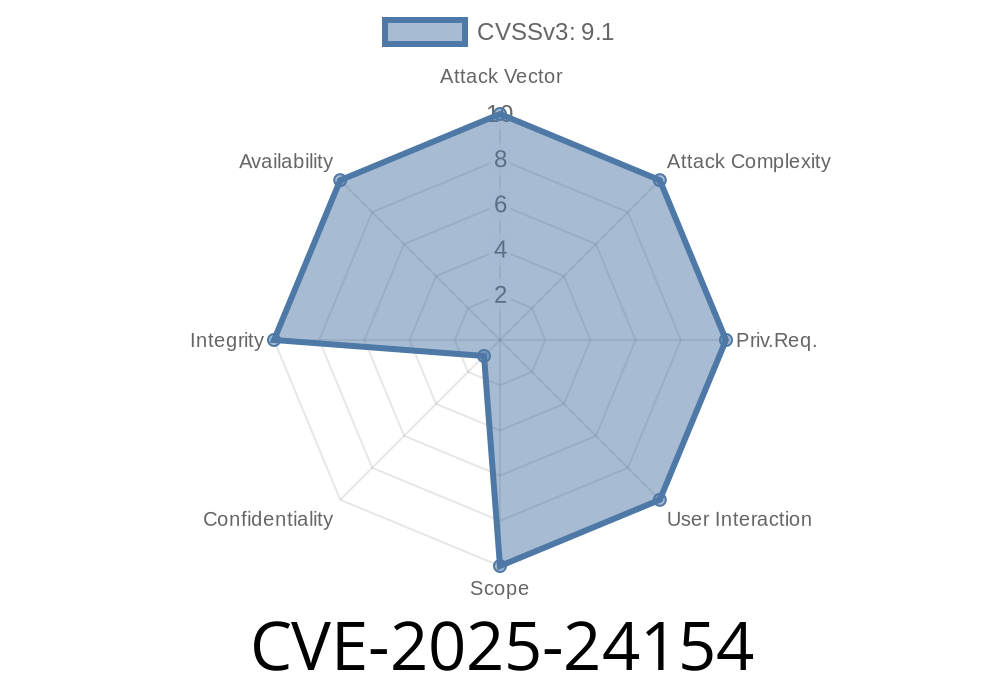Apple recently patched a critical bug—CVE-2025-24154—in several of their operating systems, including macOS Ventura, Sonoma, Sequoia, iOS, iPadOS, and even the new visionOS. This out-of-bounds write vulnerability could have let attackers crash your Mac or iPhone, or worse, corrupt the core of the system (kernel) to run malicious code. In this deep-dive article, I’ll break down what happened, how the exploit works, and show you (in simple terms) how this bug could have been abused.
What is CVE-2025-24154?
In brief, CVE-2025-24154 is an out-of-bounds write vulnerability in Apple’s kernel – the low-level software that connects hardware and all other software on Apple devices. This can let an attacker input data that isn't checked properly, causing system instability or paving the way for more severe attacks.
How Does Out-of-Bounds Write Work?
Let’s say you have a box that holds 10 apples, but someone puts in 15. The 11th, 12th, 13th, 14th, and 15th apples are outside the box, possibly falling onto something else on the table. In computers, an *out-of-bounds write* like this means data ends up in memory where it doesn’t belong, trampling over sensitive information or instructions.
Where Did This Happen?
Apple has not officially posted the specific component affected, but similar past bugs have occurred in networking and image processing parts of the kernel. Attackers can target such vulnerabilities using malicious apps, downloads, or even specially crafted websites, if the kernel is involved in handling those things.
You can read Apple’s official write-up here
- Apple Security Updates – CVE-2025-24154
- MacOS Ventura 13.7.3 Release Notes
- iOS & iPadOS 18.3 Security Content
The Vulnerability – Simple Code Example
*Note: This sample is a simplistic illustration, not Apple’s real code.*
// Imagine this C function exists in the kernel:
void vulnerable_function(unsigned int len, char *user_input) {
char buffer[32];
// Out-of-bounds write if len > 32!
memcpy(buffer, user_input, len);
}
In the above, if a hacker passes a len value larger than 32, say 100, the memcpy call writes outside buffer's boundaries. Anything after buffer in memory—including sensitive kernel control data—might get overwritten.
What Could an Attacker Do?
If someone managed to exploit CVE-2025-24154, possible results range from mere mischief to serious security threats:
- Crash the device: Overwriting critical memory could instantly bring down your Mac/iPhone.
- Gain kernel-level access: Skilled attackers might hijack the kernel, giving themselves root/admin power. This is the *holy grail* for hackers—total control of your device.
- Corrupt sensitive data: Overwrites can break device security, leak cryptographic secrets, or disrupt normal system checks.
A typical attack would go something like this
1. Craft Malicious Input: Hacker makes input that will be sent to a vulnerable system call or API, designed to exceed the allowed length and carefully crafted to overwrite specific memory zones.
Send to Target: As simple as a malicious app, a script, or even something hidden in a document.
3. Trigger Overwrite: When the system handles this input (using the buggy code), memory is overwritten.
4. Hijack Control (Optional): If the attacker is skilled, the data written could let them reroute following code execution, installing rootkit or spyware.
Realistic Exploit Sketch
Suppose a messaging app uses Apple’s kernel API underneath, and the attacker sends an oversized emoji (crafted binary). If the app doesn’t check, and the kernel fails to police size:
char hacking_payload[128] = { /* carefully crafted data */ };
// Kernel API intended for 32 bytes, gets 128
ioctl(device_handle, VULNERABLE_CMD, hacking_payload);
In practice, privilege escalation or a crash happens if things go wrong.
According to Apple’s release notes
> “An out-of-bounds write was addressed with improved input validation.”
That means Apple now checks the size of incoming data before writing to memory, like this
void safe_function(unsigned int len, char *user_input) {
char buffer[32];
if (len > sizeof(buffer)) {
// Truncate or return error
len = sizeof(buffer);
}
memcpy(buffer, user_input, len);
}
What Should You Do?
- Update right away to macOS Ventura 13.7.3 or later, macOS Sonoma 14.7.3, Sequoia 15.3, iOS/iPadOS 18.3, and visionOS 2.3
References
- Apple Security Updates
- macOS Release Notes
- iOS / iPadOS Release Notes
- CVE-2025-24154 entry at NVD (forthcoming)
Conclusion
CVE-2025-24154 is a dangerous kernel-level bug affecting a wide range of Apple products. While Apple has patched the issue with basic yet crucial input validation, the bug was a clear reminder of why *timely updates* and *good code hygiene* are so important. Hackers love out-of-bounds writes because they're a shortcut to hijacking a computer.
Timeline
Published on: 01/27/2025 22:15:19 UTC
Last modified on: 03/03/2025 22:45:11 UTC
